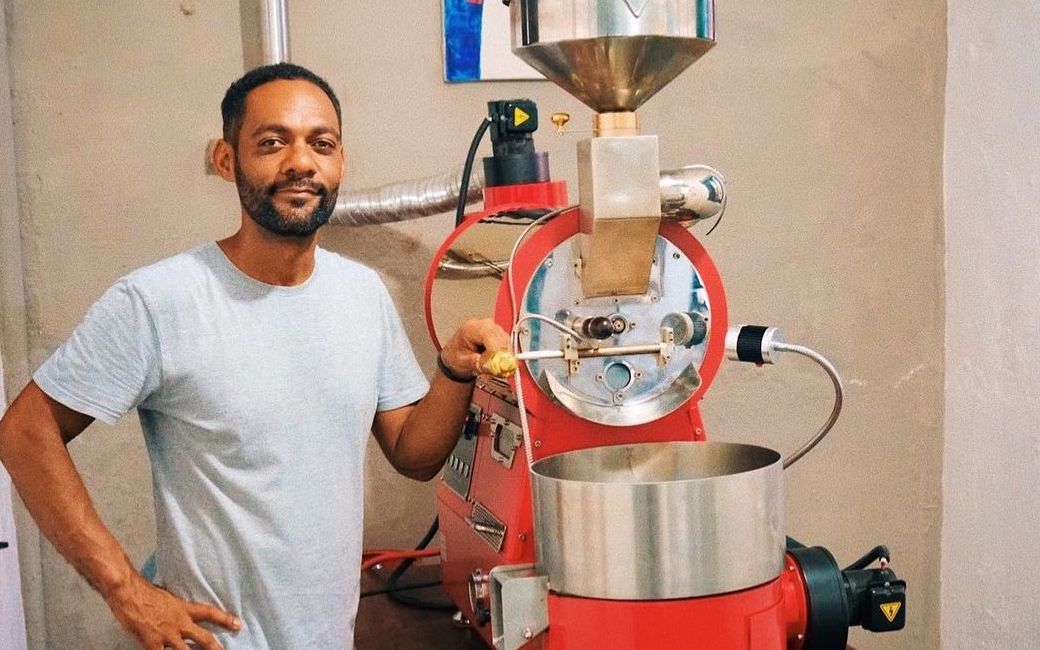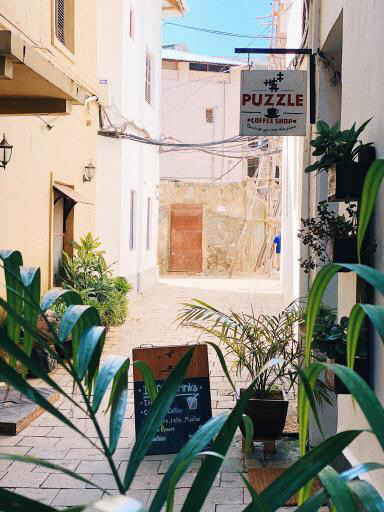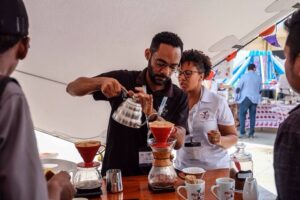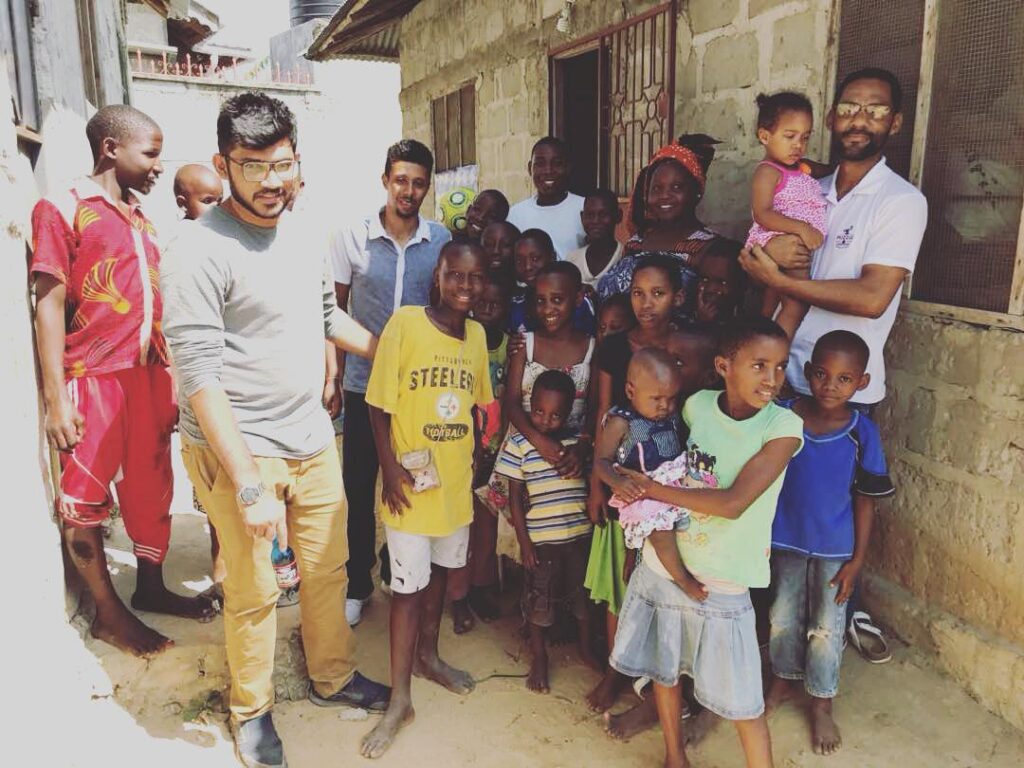5 years of Puzzle Coffee – Leo Ferreira on shaping the pieces of Tanzania’s specialty coffee community
On December 23rd, Puzzle Coffee will celebrate its fifth anniversary since its inception in 2016. We spoke with Leo Ferreira, owner of Puzzle, on how he has been running his store on the island of Zanzibar and his ambitions for specialty coffee in the country.

Leo Ferreira
Initially just a space to interact with people
Leo was feeling puzzled. Together with his wife Tais, the couple had just left their native Brazil for South Africa. They spent a good amount of time frequenting coffee shops there and were inspired to open their own space where they could interact with people. Both agreed that if one day they would open a shop, it would have to facilitate social interaction, with coffee being a medium to achieve that.
Leo then recalls telling Tais about an epiphany: “Life looks like puzzles”. There are many pieces to find and put together. It could be complicated – sometimes you will figure it out, otherwise, you’ll be scrambling to get it together, even struggling to find the missing piece. When the couple finally arrived in Tanzania and realised their idea to open a shop, the name Puzzle Coffee just fell into place.
Initially, things were not as straightforward as they may have seemed. They quickly realised that attracting local customers is not easy in a place where specialty coffee has arguably yet to take off, despite Tanzania’s reputation for coffee exports. Besides Puzzle Coffee, there is one other similar specialty coffee store in the capital of Dar Es Salam, both of which are specialty coffee establishments with a sole focus on coffee. The absence of a domestic specialty coffee scene has presented a significant challenge for the couple’s ambitions.
Based on Leo’s observations, local people would happily add syrup and spices to their coffee or tend to buy supermarket brand instant coffee. Realising it would take time to educate local consumers and get them to appreciate specialty coffee, the business had to concentrate on tourism to be sustainable since tourists typically would be more familiar with the concept.
Relying on tourism during a pandemic
When they did turn to tourists, Puzzle Coffee started to get brilliant reviews online. The staff were excited that people were coming straight to them and said they had seen them on Instagram or found them while searching online for coffee places and saw the great reviews. New customers talked to them like they have known them for ages. Leo is glad that social media has helped send customers to the store and even prompt conversations when these customers talk about what they had seen online. With increasing popularity, there was even talk of expanding Puzzle with additional branches. Then, the pandemic hit and Puzzle shut its doors for seven months.

Puzzle coffee in Tanzania
In the months that followed, tourism patterns changed, which meant Puzzle’s customers did too. When they reopened in November 2020, Leo noticed an influx of Russian tourists on the island of Zanzibar. Then came the French and Irish. In the low season, there were more customers from the Middle East who seemed to really enjoy specialty coffee. This is a picture of tourism during the pandemic, altering with domestic lockdowns and travel restrictions. With these measures in place, people had to change their travel patterns and this has heavily impacted Zanzibar, a tourist hotspot in Tanzania where the economy relies heavily on tourism.
Pulling through these tough times, Leo attributes the perseverance of the brand to adept financial management, as well as the desire to engage at length with anyone who walks through the door. That has led to valuable exchanges where visiting baristas have been invited to demonstrate their skills for Puzzle’s staff to observe and learn, and customers had engaging conversations with Leo himself and left spreading positive word about their experiences.
Reinventing himself and applying his experiences
Leo Ferreira shares that he initially struggled to relate to a new culture. Being used to organisational structure in his previous jobs, he had to break away from his own expectation of directing people to do their assigned tasks, instead of engaging them with stories and making familiar references to help them understand things better. He is grateful to have this gift of being able to read people and connect with them. For him, coffee is a platform to communicate, and Leo has stayed true to this purpose since the day he opened Puzzle Coffee.
On the financial side of things, Leo’s experiences have helped him eagerly anticipate the challenge that comes with cost control and financial management. Leo constantly checks and reevaluates processes, implementing tight controls to ensure every single aspect and expense works towards sustainable profit. With this under control, Leo always knows how much he can set aside to implement new tools and training. Besides the additional costs on coffee gear due to shipping fees and taxes, which could sometimes amount to almost 1.5x more than the retail price, there is also the matter of the hefty sum per kilo of green beans.
Finding value in an export-driven coffee scene
Leo estimates that over 90% of Tanzania’s coffee is exported, with Japan being one of its biggest buyers. The profile is very close to that of Kenya, which borders the country and has a similar climate. There are about five good coffee regions for arabica beans in Tanzania, with one of them being Mount Kilimanjaro. Leo suggests that people tend to relate Tanzanian coffee to that area because the altitude is almost two thousand metres and the profile is unique, making it prime for marketing. For Leo, he decided to get beans from lesser-known regions as he wants to educate customers and locals on the diversity of profiles and flavours all around the country.
A challenge has been buying green beans for domestic consumption as the majority is exported. Moreover, micro lots are a logistical challenge because the store is on the island of Zanzibar so prices and shipping are generally higher. Thankfully, he found a partner that mainly exports specialty grades to Germany and has worked with skilled competition baristas. Striking up a close working relationship, Leo gets to learn more about the farming of beans while the partner improves quickly through fast feedback from Leo’s clients and partners. This relationship has allowed for greater consistency in processes and the quality of coffee at Leo’s store.

Leo Ferreira is at a local event
Over time, Leo saw his work across the coffee chain as an opportunity to upskill and allow himself to be a better ambassador of coffee. He started on Specialty Coffee Association (SCA) training to attain professional certification and is now doing the Authorised SCA Trainers (AST) training. He aims to create an environment that allows baristas to learn, multiply and share their knowledge. Today this is apparent at Puzzle Coffee as his team particularly enjoys the education side of things, as they get to educate consumers about the drink, especially for filter coffee.
The challenge of finding local talent
With Tanzania’s reputation for its export of coffee beans, most local newcomers to the industry typically aspire to be Q-graders, coffee farmers, or brokers. The absence of domestic specialty coffee spaces equates to no expectation or desire to be a barista. From Leo’s perspective, people are simply not interested in specialty coffee knowledge and those who make coffee don’t necessarily identify themselves as a barista.
The team at Puzzle aims to change this by creating a local knowledge hub to influence people and promote specialty coffee. Things have started to pick up with major coffee events being held at a national level, and Leo is optimistic for further growth. With more specialty coffee shops around, there can be a nice local network. Having local championships also encourages more people to take note and take part. Leo believes that having competitions show that while anyone can brew coffee, you would need to be really good to succeed. This would help baristas push on and seek greater motivation to be exceptional in their work.

Leo Ferreira loves the local community
On his end, Leo commits to imparting life skills to his team. This includes finances to show how they can control their own money on a daily basis, and helping them understand coffee as a way of life beyond a regular job for the money. It may be harder for baristas to accept the latter because people still struggle to see the potential of a career as a specialty coffee barista within Tanzania. Leo helps them realise that they have to contribute to promoting Tanzania coffee if they want to see it grow. This is the culture shift that is necessary for talent to enter the local industry.
What the future looks like for Puzzle
Leo’s dream and mission are to really raise the knowledge and quality of coffee in Tanzania. This
“has been very challenging, but our passion has driven us in persevering and connecting with more people”.
Talking about expanding the Puzzle brand, people have asked time and again why Leo doesn’t open another outlet. He says that they are not ready, at least based on his keen financial understanding, and it would be unsustainable at this point in time with the many uncertainties in the midst of a pandemic. He still dreams of opening branches, but the brand would first need to be more established and have good baristas step up to create a local specialty coffee community.
Five years on, Leo feels he is certainly wiser from all the learnings and attempts. He wants to establish the quality of the brand and be more consistent. This includes training more local baristas, because he wants them to grow, take over, and leave their own legacy in their local coffee industry. Only then, will the puzzle be complete.

